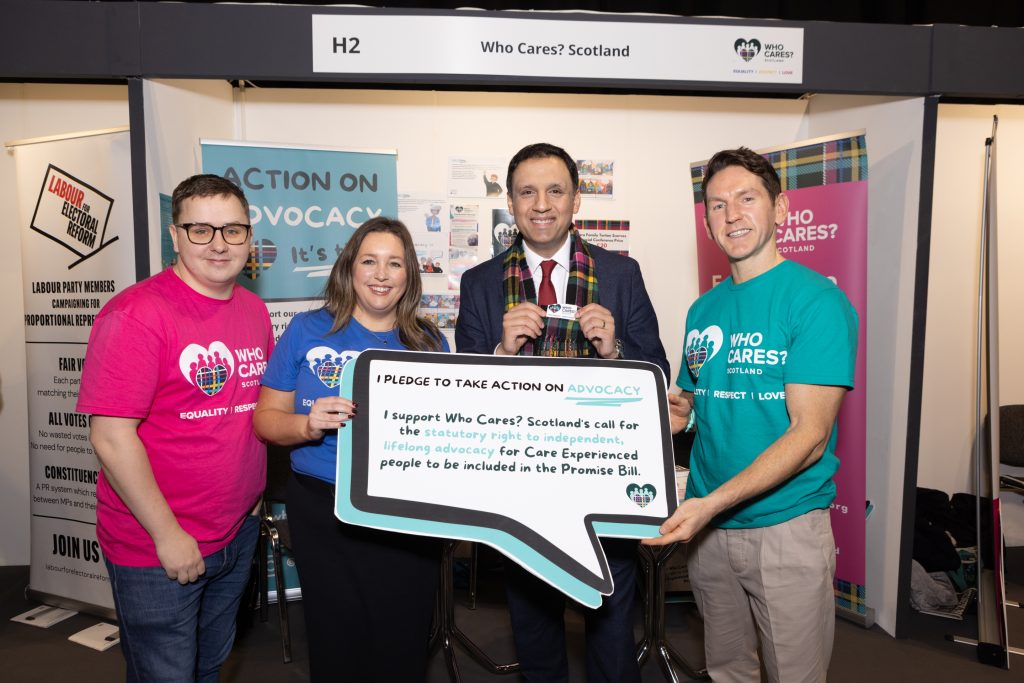Listening to Children was the Scottish theme for the International Year of the Child, back in 1979. Fast forward 46 years and this theme is as relevant then as it is now.
We have the added benefit of the UNCRC now incorporated into Scots law, and a Promise Bill on the horizon. But can Scotland translate legislation into action, to ensure that Care Experienced people are being heard?
Independent advocacy is the tool to ensure that people understand their rights and have voices heard in decisions affecting them. Whether it’s helping a young person reunite with their brother or sister, signposting Care Experienced adults to critical housing support, or accompanying a young person to their Children’s Hearing, it is a vital and valuable tool for all Care Experienced people who need it.
Since 1978, Who Cares? Scotland has been at the heart of the Care Experienced community in Scotland as its only membership organisation. In 1997, we recruited our first advocacy worker, and have been providing professional independent advocacy services ever since. Every year, our advocacy workers support over 1,600 Care Experienced people with more than 6,000 individual advocacy issues.
The right to participation (Article 12) isn’t the only right our advocates protect. We code each advocacy issue according to the UNCRC and the European Convention on Human Rights. Our data tells us that Care Experienced people, from birth to old age, are a group in society whose rights are most at risk.
As part of our Lifelong Rights Campaign, over the past year we have published a series of issue papers focusing on Care Experienced adults. These have found alarming rates of homelessness, poverty and isolation among those surveyed.
Furthermore, for 136 people aged 16+ who received advocacy over the past year who raised issues relating to dissatisfaction with services, 88% were unhappy with social work provision in particular. The main issues were around a lack of communication, disagreement with decisions and allocation of workers. This isn’t a reflection on a dedicated and compassionate group of workers, rather, it’s about a workforce at its limit with no capacity due to the economic climate.
Nevertheless, we have now passed the halfway timeframe of the delivery of The Promise; the widely supported outcome of the Care Review which was to transform care to make Scotland the best place to grow up loved, safe and respected so that children can realise their full potential.
A Promise that committed to ensure ‘Care Experienced children and adults must have the right and access to independent advocacy, at all stages of their experience of care and beyond.’
The Scottish Government tasked The Promise Scotland with scoping the need for a lifelong advocacy service and aims to introduce the Promise Bill this year which may include provisions in this respect.
This is a pivotal moment for the Scottish Government. Will their flagship policy be upheld within this term, and the Promise to the Care Experienced community kept? The Promise ‘the money’ report set out that the estimated additional spend in Scotland on universal services and supports on which there is likely to be a greater demand from Care Experienced people is £198 million.
This bleak figure is surely reason enough to invest in independent advocacy as a form of prevention and early intervention to mitigate the strain on public services and more importantly, the human cost of rights abuses from escalating and happening in the first place.
If 12,206 children are currently ‘looked after’ in Scotland, what is the population of Care Experienced individuals? And how many have access to independent advocacy? What rights issues are the majority of the Care Experienced population grappling with today? How can we possibly help when independent advocacy provision is being cut rather than invested in, or diluted in order save money in the short term, which will cost more in the long term?
Regardless of the provider, Who Cares? Scotland is campaigning to ensure that every Care Experienced person in Scotland can access independent, relationship-based, advocacy across their lifetime. Five years on from the Promise, let’s ensure its commitments around advocacy are delivered before the end of this Parliament.
It’s time to take Action on Advocacy by making it a statutory right in the upcoming Promise Bill.
To learn more about the Action on Advocacy campaign and join our call for change, visit our campaign page here.







